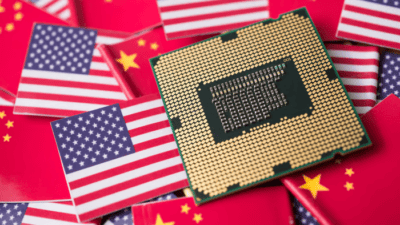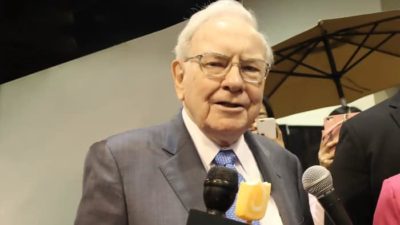This article was originally published on Fool.com. All figures quoted in US dollars unless otherwise stated.
A unique ability to buy winning stocks has made Warren Buffett the sixth richest person on the planet. His past success and folksy wisdom has made him a household name and one of the most-watched investors in the world. Fortunately, following in his stock-picking footsteps doesn't require having his phone number on speed dial. Buffett's investment company, Berkshire Hathaway (NYSE: BRK.A) (NYSE: BRK.B) files its holdings with the Securities and Exchange Commission every quarter and its latest report -- released this week -- reveals 76% of Berkshire Hathaway's $293 billion (yes, billion) portfolio is invested in just five stocks in three sectors.Buffett's biggest position
Warren Buffett's single biggest position -- valued at a jaw-dropping $121.5 billion -- is Apple (NASDAQ: AAPL). The consumer electronics juggernaut is best known for its cutting-edge computers, smartphones, and tablets, but increasingly, it's profiting from its services segment. Although consumer electronics products still account for the lion's share of Apple's sales, product revenue is highly dependent on new device launches and holiday shopping trends, making consumer electronics revenue "lumpy" throughout the year. Devices are also a relatively low-margin business. However, Apple's services business, which includes the app store, provides it with high-margin, recurring revenue that's very profit- and dividend-friendly. Last quarter, services accounted for 21.5% of Apple's total revenue, up from 16% in the same quarter of 2017. The company's trailing-12-month net income has increased to $87 billion from less than $50 billion and its dividend payout has climbed to $0.88 per share from $0.63 per share over that period. So far, Berkshire Hathaway's unrealized profit on its Apple shares is nearly $90 billion, so it's been a big winner for Buffett. Importantly, there's little to suggest he'll sour on Apple. Apple's sitting on over $194 billion in cash plus marketable securities on its balance sheet and although it's already one of the world's biggest companies, it still delivered 36% year-over-year revenue growth in the quarter ending June 30, suggesting its products and services are still winning over consumers.Betting on banks
Buffett has a penchant for easy-to-understand businesses, so it's unsurprising that two of his top five largest positions are Bank of America (NYSE: BAC) and American Express (NYSE: AXP), two financial institutions with a relatively simple business model: pocketing interest on loans. He owns $41.6 billion worth of Bank of America stock and $25 billion in American Express shares exiting June, making them his second- and third-biggest positions, respectively. Bank of America is the second-largest bank in the United States and the eighth-largest bank globally. It makes money in other ways, including via its capital markets and wealth management solutions, but most of its profit comes from charging interest on loans, including mortgages and credit cards, and fees associated with traditional banking accounts. Similarly, American Express makes money charging merchant transaction fees to retailers that accept American Express credit cards, but its main source of revenue is interest associated with small business borrowing and credit card use. Traditionally, banks like Bank of America and American Express are most profitable when the spread between their cost to borrow and interest rates charged to customers is wide. A low interest rate environment has made it harder to maximize that spread, known as net interest margin, but Bank of America and American Express are still producing earnings for shareholders. In 2020, Bank of America earned $1.87 per share and American Express earned $3.77 per share despite headwinds associated with a dramatic slowdown in economic activity caused by the COVID-19 shutdowns. In 2021, analysts estimate the companies' earnings will climb to $3.26 per share and $8.81 per share, respectively, because of rebounding GDP. If so, that should provide management even more wiggle room to increase dividend payouts, providing Buffett with additional incentive to hold onto his shares.These businesses are tasty
Sticking to his keep-it-simple investing approach, two consumer staples companies round out Warren Buffett's five biggest holdings: Coca-Cola (NYSE: KO) and Kraft Heinz (NASDAQ: KHC). Coca-Cola and Kraft Heinz are among the most recognizable brands in the world. Coca-Cola owes its recognition to its self-named soft drink, but it's expanded its product lineup in recent years to benefit from evolving trends in consumer taste. For example, it insulated itself against consumers' shift away from sugary drinks by becoming one of the biggest players in bottled and sparkling water. It even launched a hard seltzer under its popular Topo Chico brand in 2020. Berkshire Hathaway's owned Coca-Cola shares since 1988 and it currently holds 400 million shares, making it Coca-Cola's single largest shareholder. Kraft Heinz was formed by the marriage of Kraft and Heinz in 2015. The combination created a food giant, but its performance has probably been bumpier than Buffett hoped. The steep price paid to merge the companies resulted in a goodwill writedown and dividend cut in 2019, and its $37 share price is down from a peak above $90 in 2017. Nevertheless, Buffett seems committed to remaining long his 325.6 million shares. Despite cutting its dividend, Kraft Heinz still provides Berkshire Hathaway with a relatively handsome 4.3% yield, and that's far better than the Oracle of Omaha can fetch in U.S. Treasuries.This article was originally published on Fool.com. All figures quoted in US dollars unless otherwise stated.









